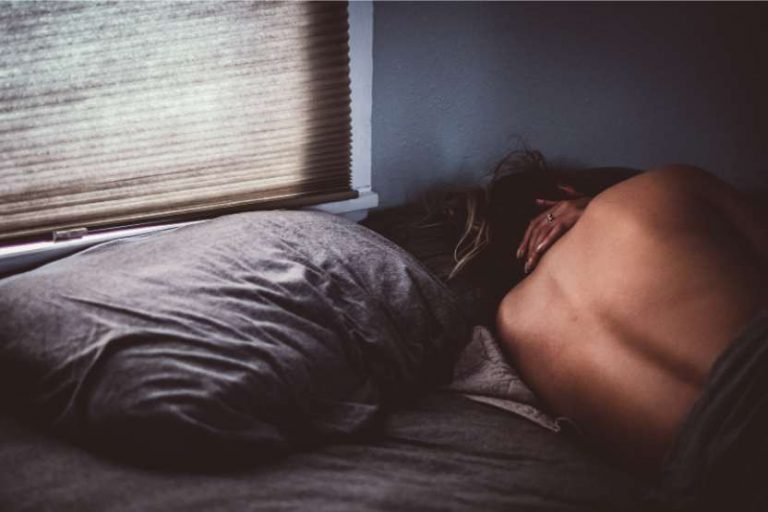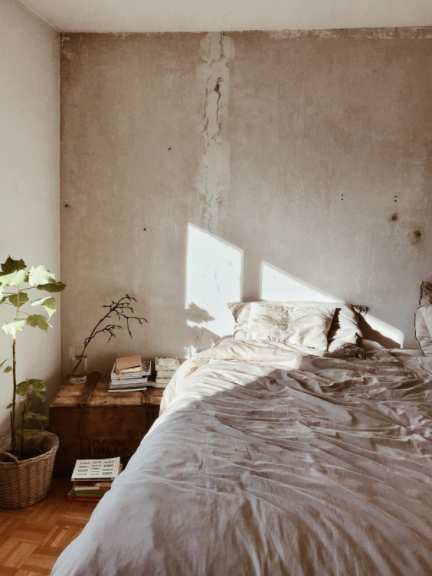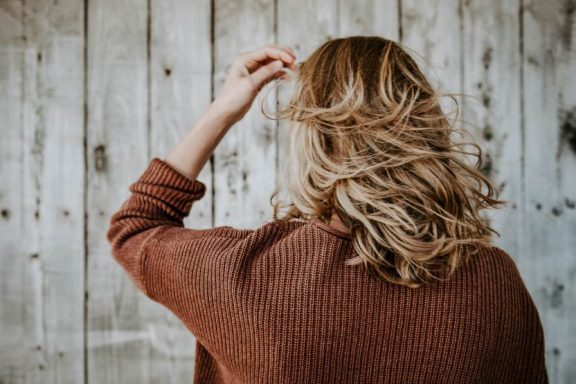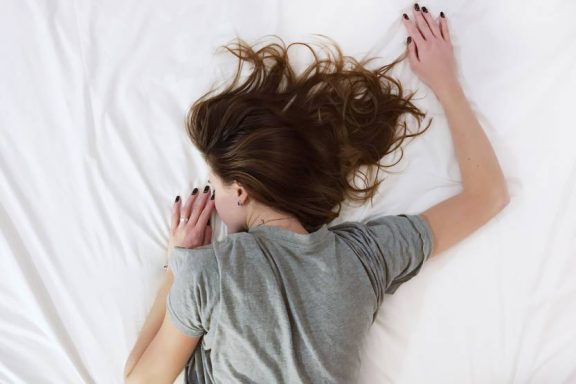Do you regularly experience anxiety about being able to fall asleep and/or stay asleep? If this is the case, then you may have what’s known as sleep anxiety. This is a sleep disorder that is becoming more prevalent in modern society.
What are the symptoms of sleep anxiety? What causes it, and what are the treatment options? We will answer all of these questions in this article.
Let’s take a look.
What Is Sleep Anxiety?
Sleep anxiety is the fear of not being able to fall or stay asleep. It’s that rising feeling of worry as you toss and turn, trying to fall asleep and start to stress because you know you will be sleep-deprived the next day.
This anxiety further prevents you from falling asleep. To understand it is to look at how anxiety and sleep are connected and how they influence each other.
Anxiety is one of the most common mental health disorders in the UK, with one in 20 people suffering from Generalised Anxiety Disorder (GAD).
Research shows that if you have an anxiety disorder, such as GAD, you are more prone to experiencing sleep disturbances, such as difficulty falling asleep, staying asleep, or experiencing restless sleep.
Considering that around a third of UK adults suffer from insomnia, while two-thirds suffer from disrupted sleep, it becomes clear why sleep anxiety is rising.
Who Is Affected By Sleep Anxiety?
Sleep anxiety can affect adults, teens, and children alike, although it is more common as we grow older. This may be due to changes in the brain and nervous system as we age and being more likely to experience stressful life events that trigger anxiety.
Anxiety can also affect children. Up to thirty per cent of school-aged children struggle to get to sleep and stay asleep all night, and anxiety is a common cause. Sometimes children pick up on the anxiety in their parents, causing them to, in turn, exhibit sleep anxiety.
People with underlying mental health disorders such as anxiety disorders, bipolar, depression, drug addictions, panic disorder, and post-traumatic stress disorder may develop sleep anxiety.
The Causes Of Sleep Anxiety
UC Berkeley researchers found that a lack of sleep can heighten regions in the brain that trigger anxiety, which further provokes anxiety and makes falling and staying asleep even more difficult.
In a normal situation, stress and anxiety will trigger our bodies to release hormones that help us react quickly to manage the problem. Still, when we produce chronically high levels of these stress hormones, especially before sleep, it can make it hard for our bodies to relax and fall asleep.
When you finally fall asleep, you may find yourself waking up during the night in a panic.
Dr Irshaad Ebrahim, neuropsychiatrist and co-founder of The London Sleep Centre and neuropsychiatrist, told AnxietyUK.org, “When our internal neurochemical systems work normally, they regulate biological processes like sleep, appetite, mood, and energy levels. If we are stressed, the Adreno-Cortical System is dysregulated, and our energy sources are diverted, resulting in sleep disruption and mood changes.”
What Are The Symptoms Of Sleep Anxiety?
Everyone experiences sleep anxiety differently, but these are the most common symptoms:
- Trouble falling and staying asleep
- Trouble concentrating
- Feeling nervous or restless
- Nightmares and night terrors
- Hypnic jerk or twitching
- Sweating
- Rapid breathing and/or heart rate
- Tense muscles
Nighttime Panic Attacks
People with sleep anxiety may experience nighttime panic attacks. Like daytime panic attacks, you will wake up with a sense of doom, increased heart rate, flushes or chills, sweating, dizziness, shortness of breath, and feeling detached from yourself.
Although it doesn’t last long, a nocturnal panic attack increases anxiety, making it even harder to fall asleep for fear of experiencing another episode.
Night Sweats
When the body’s fight or flight system is activated and stays activated through chronic anxiety, blood rushes to the parts of your body where energy is needed to fight or flee the threat.
During this process, you experience ‘vasoconstriction’ (the constricting of the blood vessels) that heats up your body. Your body then needs to cool down to prevent overheating, and it does this through sweating.
Testing For And Diagnosing Sleep Anxiety
When testing for sleep anxiety, your healthcare provider will typically perform a physical exam, look at your medical history and evaluate your symptoms.
Typically you can expect the following set of questions:
- Do you eat or drink anything before bedtime?
- Does your anxiety always occur before bedtime?
- How long does it take you to fall asleep?
- How many times do you wake up during the night?
- What activities do you do before bed?
In severe cases, a sleep study may be done to determine if you have a sleep disorder. This is called a polysomnography study. It involves you staying in a lab overnight so that they can monitor the following:
- Brain waves
- Eye movement
- Heart rate
- Muscle activity
- Oxygen levels
- Leg movements
- Sleep stages
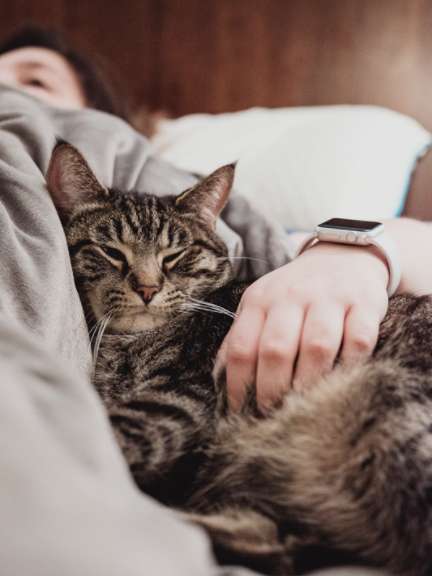
Treatments For Sleep Anxiety
There is a lot you can do to reduce your sleep anxiety, and there are specialists who can help you. These are the most prevalent treatments for sleep anxiety:
Cognitive Behavioural Therapy
Common treatments include cognitive behavioural therapy (CBT) and a particular form of CBT called cognitive behaviour therapy for insomnia (CBTI).
CBTI as therapy focuses on addressing the factors that contribute to persistent insomnia, of which sleep anxiety is one. In addition, this therapy helps people identify and replace thoughts and behaviours that cause sleep problems.
Good Sleep Hygiene
Practising good sleep hygiene is a practical way to reduce anxiety before bedtime. Try these tips:
- Practice meditation and diaphragmatic breathing relaxation techniques before bedtime to reduce anxiety
- Exercise in the morning or afternoon – not close to bedtime
- Avoid drinking caffeinated drinks in the afternoon
- Switch off all electronic devices a good hour before going to bed
- Refrain from going to bed if you’re not feeling tired
Medication For Sleep Anxiety
Medication to help with sleep anxiety may be helpful, but it does come with a myriad of physical and mental health risks.
The most significant risk is addiction through long-term use. For example, regular users can become so dependent on sleeping medicine to help them fall asleep that they become worried that they won’t be able to fall asleep without them, aiding their sleep anxiety.
If you want to stop taking sleep medication, it must be done under medical supervision because it can cause withdrawal symptoms if stopped suddenly. Symptoms of withdrawal include trouble sleeping, restlessness and anxiety—Ironically, similar to the symptoms that they were originally used for.
If you suffer from depression or GAD or are menopausal and experiencing disrupted sleep or insomnia, work with your doctor and take medication to address these issues. They may well treat your general anxiety, helping you get a better night’s rest.
Supplements For Sleep Anxiety
There are many natural sleep aids you could try to help you fall asleep. These are the most common and well-known:
Magnesium Glycinate
A chelated, activated form of magnesium, magnesium glycinate has a high bioavailability (without the side effects of magnesium oxide). It is thought to help regulate neurotransmitters that are directly related to sleep. Because chronic stress depletes magnesium in our bodies, it is an essential mineral supplement.
Melatonin
Melatonin is used to ease sleep issues, including trouble falling and/or staying asleep or jet lag. One can safely take it for a couple of months.
Valerian
The plant supplement Valerian has been used as a sleep aid for centuries. It is said to raise GABA levels (gamma-aminobutyric acid, a chemical in the brain that boosts relaxation and sleep).
It is regarded as safe to take in the short term.
Summary
Sleep anxiety is a common disorder that affects one in twenty people in the UK. The good news is that it is relatively easy to diagnose, and by taking the right supplement, you can help ease your symptoms.
Other methods to reduce sleep anxiety include practising good sleep habits such as meditation, refraining from drinking caffeinated drinks in the afternoon, not exercising before bedtime, etc.
